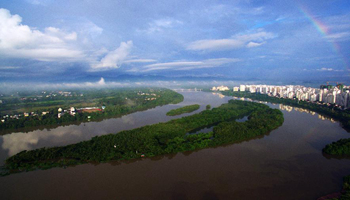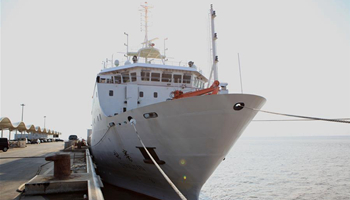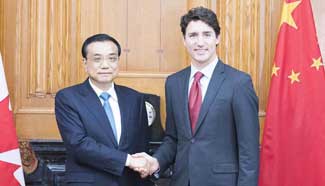by William M. Reilly
UNITED NATIONS, Sept. 23 (Xinhua) -- "The basis of world stability is being destroyed," Russian Foreign Minister Sergey Lavrov warned the UN General Assembly General Debate on Friday and blamed an unnamed "arrogant" super-power for "pushing forward unilateral hazardous solutions to the most complex conflicts and crises."
The outcome of such "feeling of their infallibility ... can be observed by the example of the bleeding Middle East and North Africa," he said in a thinly-veiled reference to the West and the United States in particular.
"It is high time to learn lessons and prevent a slide down to a catastrophe in Syria," Lavrov said. "Mainly thanks to Russia's military assistance to the Syrian legitimate government rendered at its request, it became possible to prevent the collapse of the state and disintegration of that country under the onslaught of terrorists."
Russia's engagement gave rise to the International Support Group (ISSG) encouraging a "political process so that the Syrians could determine the future of their country themselves," he said. "Hegemony has no place in the future if we want it to be a just future that gives peoples the opportunity to choose ways of their development."
Russia's commitment to that approach was reaffirmed in the Russia-China Declaration on Increasing the Role of International Law signed in June, he said.
Foreign Minister Ri Yong Ho of the Democratic People's Republic of Korea (DPRK) also laid verbal siege on the United States but with no hesitation about any name.
"As the international community witnesses every year, the situation on the Korean peninsula is often engulfed in a state that goes out of control, whose root-cause squarely lies in the United States which ... holds aggressive war exercises one after another in and around the Korean Peninsula," he said.
"These exercises are thoroughly offensive and aggressive nuclear war exercises in their nature ... aimed at 'decapitation' of the leadership of the DPRK and 'occupation of Pyongyang,'" Ri said without mentioning who he was quoting.
The foreign minister said Pyongyang "had no other choice but to go nuclear" after doing "everything possible to defend the national security from the constant nuclear threats from the United States."
But it wasn't all anti-United States, all the time in the assembly.
Countries, such as Mauritius concentrated on domestic goals.
"We have chosen to focus our first attention on the eradication of extreme forms of poverty, said Sir Aneroon Jugnauth, prime minister of the Indian Ocean island. "My Government has already undertaken, with the support of the UN Development Program (UNDP), to establish a social register of those living in dismal conditions and who require targeted measures and assistance.
"As a first unprecedented measure, we have introduced in this year's national budget a subsistence allowance for the extreme poor," he said, explaining it would be 40 percent higher than the World Bank's absolute poverty threshold of 3.10 U.S. dollars a day.
"The tourism industry of (Small Island Developing States) SIDS is particularly challenged by the negative effects of global warming," Jugnauth said. "Taking measures to reverse this trend is as essential to us as preserving marine and coastal ecosystems and biodiversity and making clean and sustainable use of oceans."
In taking steps to advance its ocean economy, he promised "Mauritius will ensure that these are in synergy with sustainability principles," enshrined in the UN's Sustainable Development Goals (SDGs) to be reached in 2030.
"Militias have no chance in succeeding," said President Bdrabuh Mansour of conflict-ridden Yemen, adding that the government would soon put an end to the ongoing war. He said comprehensive dialogue has been translated into a new civilian Constitution.
However, he said the Houthi militias continue to wage war and kill innocent people, expel civilians, blow up homes and control national assets.
"We are not advocates of revenge," Mansour said, adding that the government had chosen the path of peace in order to end the suffering of the Yemeni people and national dialogue was necessary to build a federal state based on equal rights.
"Militias and sectarian gangs, must withdraw and endorse the new Constitution," he said.
Vice President Mokgweetsie Masisi of drought-hit Botswana said his small country surrounded by South Africa is about to celebrate its 50th anniversary, rising up from one of the poorest country in the world to be a middle income country (MIC).
But, "Like many nations, Botswana is already feeling the adverse impact of climate change," he said. "Such impact manifests through decline in agricultural production, increasing food insecurity and increasing water stress."
"These are projected to worsen with time," Masisi said. "The threat posed by climate change must not be underestimated. Urgent and effective global action on climate change mitigation and adaptation is required to avoid the catastrophic consequences of global warming."
He called on this assembly session to provide "a strategic opportunity for injecting the much needed political momentum into the effective implementation of the Agenda 2030," the SDGs.
"Highly Indebted MICs like Jamaica, a group I call the "HIMIC" countries, are poised for economic transition with relatively high levels of health and education attainment," said Prime Minister Andrew Holness of Jamaica, admitting his Caribbean isle has some problems.
"However, in a climate of historically low economic growth, this potential is gravely threatened, ironically, by having to choose between debt repayment and catalytic growth spending," he said. "For Jamaica, there is no choice. Jamaica must and we are repaying our debt."
"However the consequence of this is that there are no resources available for the government to make the kinds of public investment that can stimulate economic activity," Holness said. "In addition, spending on critical issues such as security, the absence of which negatively impacts growth, is compromised."










